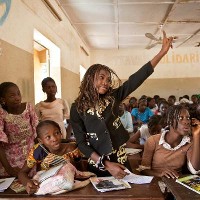09 January 2017
Wolfgang Lutz joins independent group of scientists to draft UN Global Sustainability Development Report
In July 2016, United Nations Members States decided to produce a Global Sustainable Development Report (GSDR) every four years with the aim to inform the high-level political forum on sustainable development when it meets under the auspices of the united Nations General Assembly to review the progress made on the 2030 Agenda for Sustainable Development and the Sustainable Development Goals. The report will strengthen the science-policy interface and provide a strong evidence-based instrument to support policymakers in promoting poverty eradication and sustainable development.
The next GSDR will be published in 2019 to inform the first high-level global review of the 2030 Agenda in September 2019.
Following an extensive open selection process Ban Ki-moon, Secretary-General of the United Nations from January 2007 to December 2016, invited 15 eminent scientists to serve on this independent group, among them IIASA World Population Program Director Wolfgang Lutz.
"This can be seen as a first step towards giving the scientific community a separate standing, distinctly different from governments and NGOs", so Lutz. "This new independent group is a quite revolutionary institution in the UN system. Unlike IPCC and other processes, the report independently produced by this group does not require approval by governments but will be published directly and serve as basis for discussions in the General Assembly as well as other high-level UN bodies."
During his long career, Lutz has worked on family demography, fertility analysis, population projection, and the interaction between population and environment. He has conducted a series of in-depth studies on population-development-environment interactions in Mexico, several African countries, and Asia, has authored a series of world population projections produced at IIASA and has developed approaches for projecting education and human capital. The latest set of population projections was published in 2014 in a massive volume with 1056 pages entitled “World Population and Human Capital in the 21st Century” (eds. W. Lutz, W. Butz and Samir KC). This effort include projection results for all countries in the world by age, sex and level of education and is currently likely the most comprehensive assessment of the global state of knowledge about future population and human capital trends.
Lutz is author and editor of 28 books and more than 200 refereed articles, including seven in "Science" and "Nature". In 2008 he received an ERC Advanced Grant, in 2009 the Mattei Dogan Award of the IUSSP, and in 2010 the Wittgenstein Prize. With the latter he founded the Wittgenstein Centre for Demography and Global Human Capital, a collaboration between IIASA, the Vienna Institute of Demography (VID) of the Austrian Academy of Sciences, and the Vienna University of Economics and Business (WU).
IIASA Human Capital Projections
United Nations Press Resease
PUBLICATIONS



